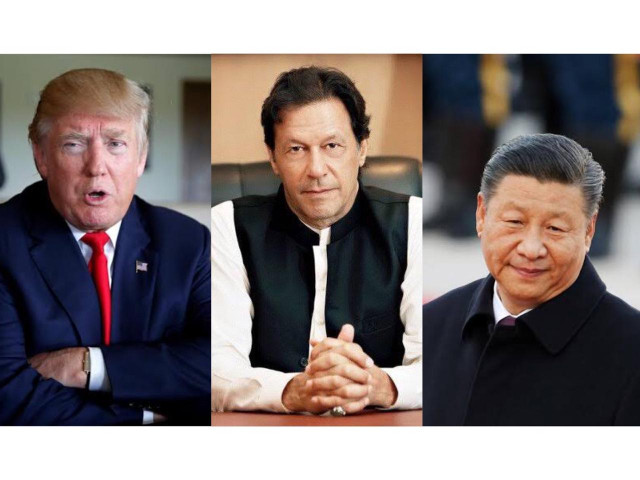US, China and Pakistan: the awkward trio
It is ironic that despite being central to interests of both, Pakistan has not been able to benefit from either

FILE PHOTOS
In a much more connected world, enhanced trade ties and global value chains leave little space for countries to isolate themselves from others. On the technology frontier, telecom giants — hungry to provide faster connectivity to their ever-expanding consumer base, and governments keen to provide better services to their citizens — are eager to jump on the 5G bandwagon, with little regard to if and when the US will catch up. And with 70+ countries plugged into the BRI, with access to vast Chinese coffers, low-cost manufacturing capabilities and a rapidly-expanding consumer market, there is even lesser room for a firewalled world, which could jeopardise these inextricable partnerships.
So far, Pakistan has managed to pull off a balanced relationship with both the US, a traditional ally with unparalleled strategic importance, and China, an emerging superpower that has pumped unprecedented quantum of infrastructure financing into the country. On one hand, Trump can be seen standing in Davos, claiming that the two countries have never been this close, and on the other, President Xi Jinping considers the China-Pakistan Economic Corridor (CPEC) as the flagship project of the BRI. But beneath the balanced foreign policy and dazzling optics lies an awkward trio, in which Pakistan is stuck in the middle of the US-China tug-of-war.
Pakistan remains central to the US interest for any peace deal in Afghanistan, and with the temperature of the US-Iran conflict rising, Pakistan’s role in the region has become all the more important. This importance is not lost to the US, but it is still not clear what the US is willing to offer in return. Instead, what Pakistan has been getting is an admonishment on CPEC.
Pakistan is in dire need of the US support to get out of the FATF’s grey list and to promote the Kashmir cause. However, the guarded optimism showed by Pakistani officials in their recent statements indicates that Pakistan has not received the kind of support on FATF that it was expecting. Similarly, on Kashmir, notwithstanding the lukewarm offers to mediate, it is highly unlikely that the US will openly side with Pakistan against India.
Contrary to the US, China has been much more vocal in supporting Pakistan and far less concerned with its dealings with the US, as long as they don’t affect Pak-China relations. But Pakistan’s own challenges stand in the way of a full-scale economic partnership with China, as originally envisaged. The CPEC pipeline is drying up and Pakistan is no more in a position to take on new infrastructure projects, owing to IMF’s restrictions and a tight fiscal policy. The signing of second phase of the China-Pakistan Free Trade Agreement has paved the way for much deeper economic cooperation between the two countries. But for these new trade opportunities to materialise, Pakistan needs new investment and superior technology. The much-touted special economic zones (SEZs) that were supposed to provide the stimulus through relocation of Chinese enterprises are still nowhere near completion. And despite the talk of the second phase of CPEC, the stalemate continues.
It is ironic that despite being central to the strategic interests of both superpowers, Pakistan has not been able to fully benefit from either. No one can disagree with Pakistan’s stance to remain neutral in the US-China disengagement but how this balanced posture can be translated into concrete benefits for the country remains the real question.
Published in The Express Tribune, February 4th, 2020.
Like Opinion & Editorial on Facebook, follow @ETOpEd on Twitter to receive all updates on all our daily pieces.















COMMENTS
Comments are moderated and generally will be posted if they are on-topic and not abusive.
For more information, please see our Comments FAQ